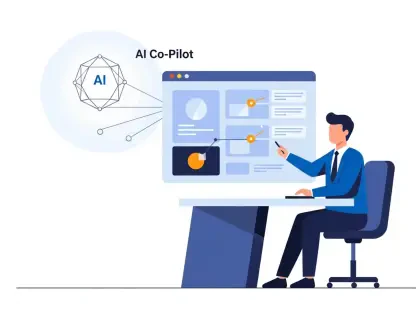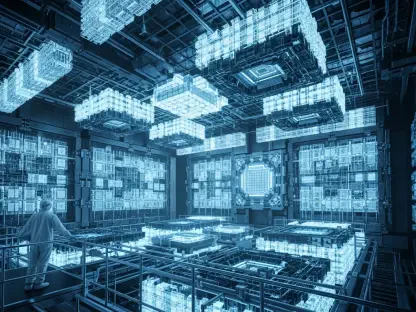The realm of technology stands at a pivotal juncture in 2025, with artificial intelligence reshaping the very fabric of software engineering. A staggering statistic reveals that over 80% of coding tasks in routine development are now automated by AI tools, raising questions about the future role of human engineers in this dynamic landscape and unveiling a wealth of opportunities for those poised to adapt.
The Current Landscape of AI and Software Engineering
Artificial intelligence has permeated nearly every facet of the software engineering industry, driving unprecedented changes in how technology is developed and deployed. From automating mundane coding tasks to enhancing complex project workflows, AI’s integration has become a cornerstone of modern tech environments. Major players like Meta and OpenAI have spearheaded this shift, leveraging AI to streamline operations and innovate at scale, as noted in recent industry analyses.
This pervasive influence of AI, however, does not diminish the critical role of software engineers. Instead, it underscores their importance as the architects of innovation, tasked with harnessing AI tools to push boundaries beyond automation. Their expertise in navigating these advanced systems ensures that technology aligns with human needs and strategic goals.
Industry reports further highlight this symbiotic relationship, emphasizing that while AI handles repetitive processes, human engineers remain central to creative problem-solving and strategic oversight. Their ability to adapt and innovate within an AI-augmented framework positions them as vital cogs in the tech ecosystem, driving progress in ways machines alone cannot achieve.
AI’s Impact on the Software Engineering Job Market
Emerging Trends and Role Evolution
AI’s capability to automate routine coding tasks has significantly altered the landscape for junior and mid-level software engineers. Many repetitive functions, once the domain of entry-level developers, are now handled by sophisticated algorithms, prompting a reevaluation of traditional roles within the industry. This shift, while challenging, opens new avenues for growth in more complex areas of development.
Consequently, the focus for many engineers has moved toward strategic and AI-augmented positions that prioritize design and innovation over manual coding. Professionals are increasingly expected to oversee AI systems, ensuring they align with project objectives while pushing creative boundaries. This evolution reflects a broader industry trend toward higher-value contributions from human talent.
New job categories, such as AI engineering and forward-deployed engineering, have emerged to meet growing consumer and market demands for tailored solutions. These roles require a blend of technical prowess and strategic insight, highlighting the necessity for engineers to adapt to a rapidly changing environment driven by technological advancements.
Market Growth and Future Projections
Recent data paints an optimistic picture of the software engineering job market, with an 800% surge in postings for AI-related roles over the past year. Additionally, senior positions in machine learning are projected to grow by 40% from 2025 to 2028, reflecting a robust demand for specialized expertise in this field. These figures underscore the expanding opportunities within the sector.
Forecasts from reputable sources like Gartner suggest that AI will create more jobs than it eliminates by 2027, reinforcing the notion that automation serves as a catalyst for new professional pathways. This balance between job displacement and creation offers a promising outlook for engineers willing to pivot toward emerging demands. The industry appears poised for a net positive transformation in employment dynamics.
Looking ahead, the interplay between automation and opportunity will likely define the trajectory of software engineering careers. As AI continues to evolve, it will necessitate a workforce skilled in leveraging these tools for innovation, ensuring that human engineers remain at the forefront of technological progress with a clear path to relevance.
Challenges in an AI-Driven Tech World
The rapid integration of AI into technology workflows presents significant challenges for software engineers, particularly the fear of job displacement among entry-level and outsourced roles. Many professionals in these categories face uncertainty as automation takes over tasks that once formed the backbone of their responsibilities. This reality necessitates a proactive approach to career planning.
A notable gap is widening between junior and senior positions, with the latter requiring advanced skills that are often out of reach for less experienced engineers. This disparity creates pressure to upskill quickly, as the industry demands proficiency in AI tools and strategic thinking. Addressing this divide is crucial for maintaining a balanced and inclusive job market.
Solutions to these challenges lie in continuous learning and the cultivation of human-centric skills like creativity and problem-solving, which remain beyond the reach of AI. By focusing on these areas, engineers can differentiate themselves in a competitive landscape. Additionally, embracing AI tools to enhance productivity offers a practical way to stay relevant and deliver impactful results in an evolving tech world.
Navigating Skills and Compliance in the AI Era
As AI becomes ubiquitous, the skill set required of software engineers is undergoing a profound transformation. Proficiency in areas such as prompt engineering, data fluency, and seamless AI integration is now essential for maintaining a competitive edge. These competencies enable professionals to harness AI effectively, turning potential threats into powerful allies in development processes.
Compliance with data security and ethical AI usage standards also emerges as a critical concern in this era. With AI tools handling sensitive information, engineers must adhere to stringent guidelines to protect user privacy and ensure responsible deployment. This responsibility adds a layer of complexity to their roles, demanding vigilance and a commitment to best practices.
Regulatory changes surrounding AI deployment further complicate the landscape, potentially reshaping software engineering practices. Staying abreast of these evolving standards through continuous education is vital for professionals aiming to meet industry expectations. By prioritizing learning and adaptability, engineers can navigate these challenges and contribute meaningfully to a technology-driven future.
The Future of Software Engineering with AI
Looking to the horizon, the collaboration between AI and human engineers promises to define the future of software engineering. This partnership is expected to enhance productivity, with AI handling operational tasks while engineers focus on strategic innovation. Such synergy will likely drive the industry toward groundbreaking advancements in technology.
Emerging technologies, including advanced machine learning, stand to further transform professional roles by introducing new tools and methodologies. These developments will challenge engineers to continuously refine their expertise, ensuring they remain equipped to tackle complex problems. The pace of change suggests a dynamic and ever-evolving field with vast potential for growth.
Global economic conditions and consumer preferences for AI-driven solutions are also shaping demand for skilled engineers. As industries across sectors like manufacturing and finance adopt AI for cost reduction and improved decision-making, the need for engineers to design and oversee these systems grows. This trend points to a robust future where human expertise remains a cornerstone of technological progress, with new disruptors and growth areas on the horizon.
Conclusion: Embracing the AI Revolution
Reflecting on the insights gathered, it becomes evident that AI has presented both formidable challenges and remarkable opportunities for software engineers throughout this transformative period. The journey through automation and role evolution highlights a landscape where adaptability proves essential for survival and success.
Looking back, the enduring value of human expertise in innovation and complex problem-solving stands out as a key takeaway from this exploration. To move forward, engineers are encouraged to prioritize upskilling in AI integration and strategic thinking, ensuring they can leverage these tools for maximum impact.
As a next step, fostering a culture of continuous learning and collaboration emerges as a critical strategy. By viewing AI as a partner rather than a competitor, software engineers can position themselves at the forefront of industry advancements, ready to tackle future challenges with confidence and ingenuity.









